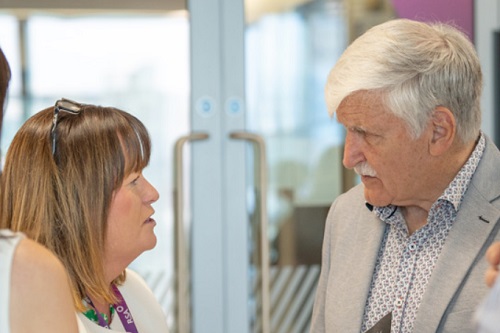RSA's Barbara O'Reilly 'It’s not everyday you meet one of your heroes'

Authored by RSA
Barbara O’Reilly, Global Network Director (pictured), shares a blog post about her past aid work in Rwanda. She tells us what it felt like to meet one of her long-time heroes, General Dallaire (pictured), Force Commander of the United Nations Assistance Mission for Rwanda. The founder of the Dallaire Institute recently visited RSA’s London office for a special in-person event.
Tell us, Barbara, about your role at RSA and how long you’ve been at the company for?
I am the RSA and Intact Global Network Director supporting the Global Speciality Business and have been with RSA for almost ten years. I have responsibility for ensuring that we have partnerships and representation around the globe to support our multinational clients. The job requires regular travel to visit our own offices and those of our partners, both to support their multinational business and ensure that they meet their contractual obligations when they front for us. The Global Network Team is based in the UK. I also have responsibility for the Global Network and the US Servicing Team based in New York.
What does life look like for you outside of work?
I live in Dublin with my husband David. We enjoy family time together. We travel when we can and we also have a keen interest in Gaelic games. Over the past fifteen years I have spent several years on the board of various charities. These include Concern Worldwide and Sightsavers Ireland – both international aid charities – and the Marie Keating Foundation, a cancer support charity.
Can you tell us a bit about the aid work you undertook in Rwanda?
During the Rwanda crisis In 1994, I was working in Dublin for Concern Worldwide, an international aid and development charity. I was asked to go there for a few weeks to be part of the team setting up our aid response to the genocide and the ensuing refugee crisis.
In the late summer of that year, I travelled into the aftermath of the genocide where more than 800,000 people had been systematically murdered. When we arrived Canadian General Romeo Dallaire, was the UN Force Commander for the United Nations Assistance Mission in Rwanda. He had spent the previous months pleading with the UN to send enough troops to maintain peace. They eventually sent a large peace-keeping force but not in time to save the many people murdered by the Hutu militia. They wreaked havoc across the country.
I stayed in Rwanda for two years, later working for the United Nations myself, working to support refugees and unaccompanied children. The most rewarding job I had was managing a centre for unaccompanied minors. Our focus was reuniting children with family members who had been separated during the massive refugee movements. The experience had a lasting effect on me. In more recent years I served as a board member for Concern Worldwide in Dublin, London, New York and Seoul. Concern Worldwide has a reputation for being a quality organisation delivering long-term development and emergency scenarios.
Tell us more about your connection with General Dallaire and the Dallaire Institute.
When he returned to Canada, General Dallaire struggled with PTSD and mental health challenges while trying to come to terms with the trauma, grief, and guilt of the situation. Over several years, he wrote books about his experiences. He became a Canadian senator and turned his attention to issues he experienced in Rwanda. As a result, he set up the Dallaire Institute for Children, Peace, and Security.
When I learned that RSA was to be acquired by Intact, I was thrilled to discover that they were also a founding funder and decade-long partner of the Dallaire Institute for Children, Peace and Security. The Dallaire Institute conducts research, and partners with governments worldwide to deliver military and police training. The Institute’s aim is to prevent children from being recruited and used in conflict. They also conduct training on how to disarm child soldiers. I personally witnessed the Rwandan army use thousands of children as child soldiers. I was regularly confronted by young teenage children at checkpoints heavily armed with AK47s, something so foreign to us in the UK.
RSA recently hosted General Dallaire who visited from Canada, can you reflect on the event and how you felt meeting General Dallaire after all these years?
I was thrilled to be able to speak to him about our time in Rwanda. From my perspective, he is a hero. He turned the adversity of what he experienced in Rwanda into a force for good by influencing governments and advocating against the use of children in war. I was interested to hear more from him about the work of the Dallaire Institute. One day





